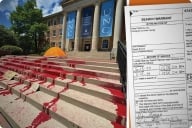You have /5 articles left.
Sign up for a free account or log in.
An interesting tidbit from a recent piece in The New York Times: polling around the 2016 election systematically undercounted the less educated, especially white people without college degrees who live in rural areas. Which is to say, Trump’s base.
As most people reading this know, polling works largely through a system of “weighting.” You interview a sample of, say, 1,000 people. You recognize that the sample is unlikely to be fully representative of the actual electorate, and you correct for this by giving “weight” to categories and groups you believe exist in the real electorate but don’t fully show up in your sample.
One of the reasons the 2016 polls that strongly predicted a Hillary victory were so wrong is because the people running those polls didn’t give proper “weight” to certain parts of their sample. Which parts? White people with no higher education who lived in the countryside.
It is a big deal to be vanished in this manner. It means that in the way the democracy is being imagined, you don’t exist. You have been erased. Made invisible.
As those words crossed my mind, they had the effect of stopping me in my tracks. Is it not striking that the language used by well-educated urban diversity progressives to describe the groups that they (we) tend to favor -- people of color, women, immigrants, LGBTQ folks, Muslims, etc. -- could very easily, in the case above, be used to describe working-class white people without college degrees?
I am familiar with the outraged conversations in Muslim circles about what we think of as the systematic undercounting of Muslims in surveys. We Muslims are mad when people run surveys that say there are only two to three million of us in the country. We think the number is closer to five to six million, maybe more. We argue that people doing surveys regularly undercount immigrants and black people. They don’t know how our family structures and households operate (lots of extended families, more people per household), or the fear we feel when a pollster type calls asking questions in the era of deportations and surveillance. We know that there are consequences to being undercounted: politicians will pay less attention to our concerns; federal dollars will not flow toward our needs.
Shouldn’t the same concern apply when a different group is being systematically undercounted? Doesn’t the above case illustrate a striking divide in America -- namely, the divide between college-educated multicultural urban America and less educated rural white America?
Tara Westover, the author of Educated, recently did a powerful interview with The Atlantic on life in less educated America. Here’s what she says:
Where I’m from is dying. It’s an entire ecosystem in decline. I was with my cousin recently, driving through the county seat where I grew up -- a little town of about 5,000 people called Preston, Idaho. We were passing down the main street, and I saw that every single shop we’d gone to as kids was boarded up. But there was a brand-new funeral parlor, bringing the town’s total funeral parlors to two. That means the town now has one grocery store and two funeral parlors. My cousin turned to me and said, “You know what? It’s getting so the only thing there is to do around here is die.”
The ugliness goes both ways. Many of those less educated people that the pollster types couldn’t imagine voted to vanish the lifestyles of the people conducting the polls.
This, it seems to me, is a pretty good miniature of our nation at the moment. America as it is imagined by one group of people not only doesn’t have room for other groups, it doesn’t even think those other groups exist. And when that other group announces its existence, it does so by taking an eraser to the first.
Westover, in that Atlantic interview, calls this the process of “breaking charity” with one another. It’s a term from the time of the Salem witch trials when people who once saw themselves as part of the same community “disfellowship” each other. It is one of the tragedies we are witnessing in America today.
It reminds me of an early scene in Tony Kushner’s Angels in America:
Harper: I'm a Mormon.
Prior: I'm a homosexual.
Harper: Oh. In my church we don't believe in homosexuals.
Prior: In my church we don't believe in Mormons.
But you can’t do that in America. The people whose identities you might not like, well, they still exist. You can vanish them from your polls, but they can still vote. You can vote against their lifestyles, but they can still have their say. You can claim you don’t believe in them, but they will find ways to make their lives known.
We might as well learn how to imagine one another, build back the charity that has been broken, find ways to re-fellowship.
The American idea begins and ends with believing in each other.





